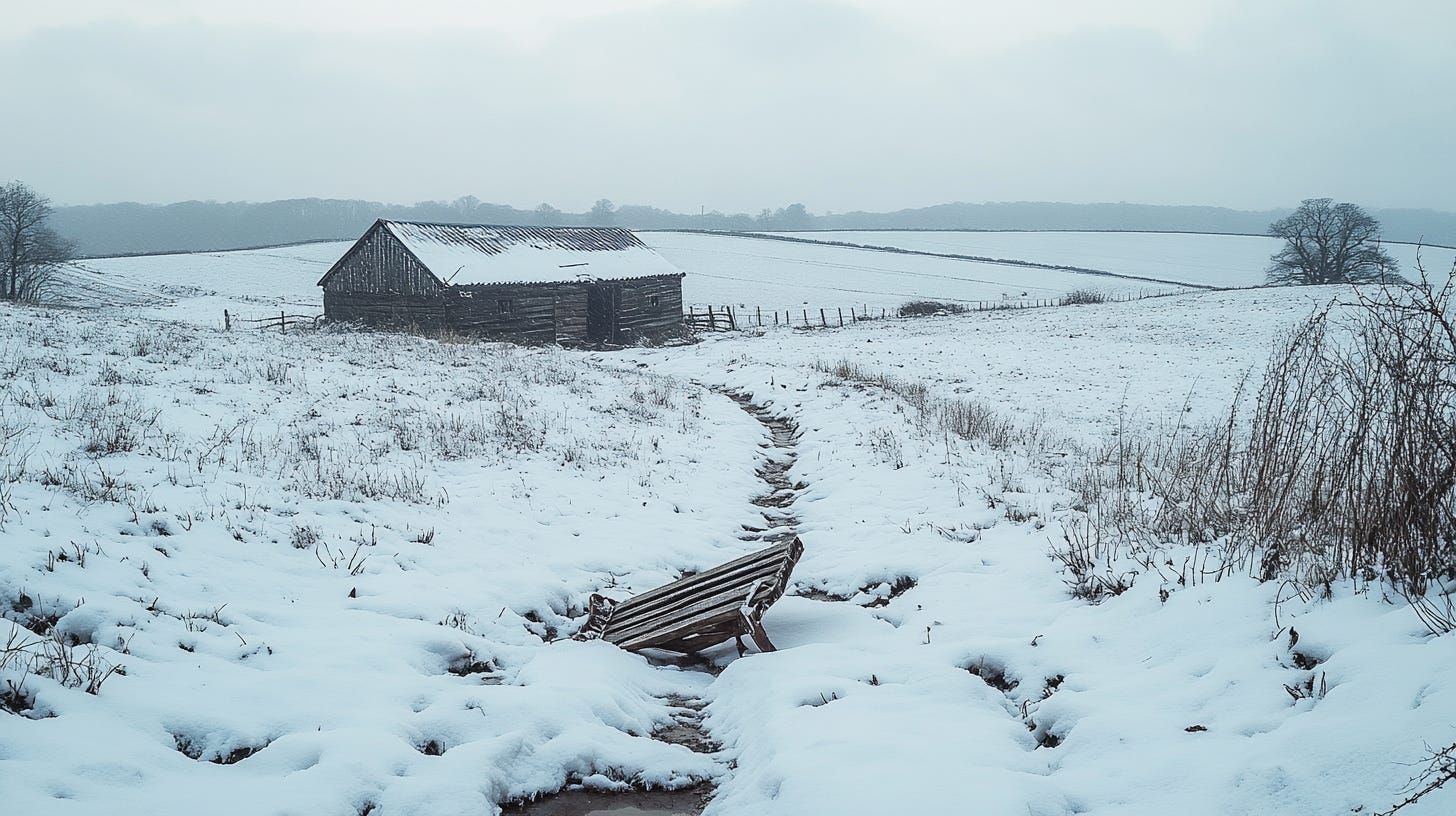Before Holding On was a novel, it was a pattern: of gestures, silences, things people held onto because they didn’t know how to let go.
The Ralph in Holding On—milkman, watcher, a man both there and fading—is a direct homage to the real Ralph from my childhood. He delivered milk by horse and cart, before his health gave out. Then his wife, Lily, took over the deliveries.
After that, Ralph had just waited—for Lily to return from her rounds, for the kettle to boil, for the world to keep moving without him.
Sometimes, I was allowed to join Lily on her collections. Going from house to house as people settled up for the week’s milk.
This piece began life as a much longer essay called Chicken Run. What follows is a stripped-back return to the same memory—just the cold, the rope, the boots, the silence. It never really left.
I revisited it because the world I’m writing now still belongs, in part, to theirs.
The first three chapters of Holding On are live at brittleviews.com. New ones drop every Wednesday.
Everything Was White Until It Wasn’t
Seanor Lane is 320 yards or 293 metres long, and I used to know each and every one of them. My world was shaped by its edges: one footpath to the brook, another to the green, and a slope that vanished into the woods.
Mum’s rule was fixed:
“Don’t, under any circumstances, go past the end of the lane.”
She never said why.
I never asked.
I just believed her.
Sometimes Lily let me walk the rounds with her, collecting milk payments from the houses on Seanor Lane and Parkhouse Road. Coins passed hand to hand, usually with a nod or a few soft words. I liked the quiet of it—the rhythm, the way people trusted her to show up.
We’d stop by her house too, near the bottom of Parkhouse Road, where her husband Ralph sat by the back window like a habit no one questioned.
My brother John remembers Ralph as the milkman, before his health gave out. He used to deliver by horse and cart, and sometimes John got to ride along.
I couldn’t picture it.
The Ralph I knew never stood.
He wore a wool hat indoors and slurped tea from a saucer like it was his only task left.
He didn’t speak—not to me.
Just stared out at the backs of the terraces.
I watched him the way you watch something you’re afraid of becoming.
Then came the snow.
Thick. Slow-falling.
The kind that covers what you were told not to touch.
John—fourteen, and already angling away from childhood—dragged the sled out from the garage.
I was six. I was there as ballast.
We went up to the Pilsley hill. I begged to steer.
John said no.
I begged again, louder, until even his friends sighed.
He’d been stringing me along all afternoon—grinning, teasing, always about to say yes.
At the end, maybe out of pity, or because his friends were watching, he handed me the rope.
He ran through the rules like a teacher.
His voice flat, certain.
The last line stuck:
“Whatever you do—don’t let go.”
I didn’t.
The sled took off like it had been waiting.
My body hadn’t.
I flew.
The hill blurred.
The fence at the bottom didn’t.
I heard voices yelling—Jump! maybe.
I closed my eyes.
The crash cracked through me.
The snow stung.
I opened my eyes, half-buried, fingers locked around the rope.
John crouched beside me, pale.
“Why didn’t you jump?”
“Because you told me not to let go.”
He looked at me like I’d just told him the moon was made of cheese.
Then said nothing.
One runner was split clean.
We didn’t tell Mum.
Later—another year, another storm.
John was off at university now.
I don’t remember how I got the sled out.
Only the need.
The pull of it.
To get it right this time.
I didn’t go back to the woods. That would’ve been too far.
I stayed within Seanor Lane.
Plausible deniability.
I chose Lily’s field.
It looked untouched.
White, clean, quiet.
The chickens watched from the sheds.
They didn’t move.
They knew their place.
I set the sled just past them.
My gloves were tight.
My scarf scratchy.
I was wearing my new Chelsea boots—zippered, like John’s.
I loved them more than I’ll ever admit.
I ran.
I pushed.
I jumped.
Fifteen seconds in, the sled stopped.
I didn’t.
I’d landed in something warm.
Thick. Slippery.
Moving slightly beneath me.
A pond of chicken shit.
Hidden under the snow.
The smell rose slowly, then all at once.
I gagged.
It was in my nose, my eyes, my mouth, inside my gloves.
And I hated myself—so fast, so hard, it shocked me.
I walked home crying without sound.
The sled dragged behind me like punishment.
My boots squelched.
I couldn’t tell if I was cold or just ashamed.
Mum opened the door.
Looked once.
“You are not coming in here like that.”
I stripped in the porch.
Air sharp on my skin.
The zippers wouldn’t budge—clogged.
I pulled until they gave.
She left a towel by the sink.
Still warm.
I still remember the rope.
Warm in my glove.
How tightly I held on.


